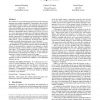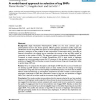429 search results - page 77 / 86 » Polymorphic typed defunctionalization |
TLDI
2010
ACM
14 years 4 months ago
2010
ACM
ML modules are a powerful language mechanism for decomposing programs into reusable components. Unfortunately, they also have a reputation for being “complex” and requiring fa...
TACS
1994
Springer
13 years 11 months ago
1994
Springer
In this paper we present a semantic theory for Concurrent ML. It consists of a new effect-based type system and a denotational model. The new type system is based on an extension o...
POPL
2010
ACM
14 years 5 months ago
2010
ACM
We describe a new automatic static analysis for determining upper-bound functions on the use of quantitative resources for strict, higher-order, polymorphic, recursive programs de...
GECCO
2005
Springer
14 years 1 months ago
2005
Springer
In medical research, being able to justify decisions is generally as important as taking the right ones. Interpretability is then one of the chief characteristics a learning algor...
BMCBI
2006
13 years 7 months ago
2006
Background: Single Nucleotide Polymorphisms (SNPs) are the most common type of polymorphisms found in the human genome. Effective genetic association studies require the identific...


